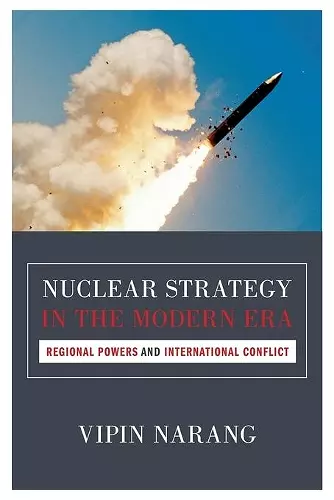Nuclear Strategy in the Modern Era
Regional Powers and International Conflict
Format:Paperback
Publisher:Princeton University Press
Published:23rd May '14
Should be back in stock very soon

The world is in a second nuclear age in which regional powers play an increasingly prominent role. These states have small nuclear arsenals, often face multiple active conflicts, and sometimes have weak institutions. How do these nuclear states--and potential future ones--manage their nuclear forces and influence international conflict? Examining the reasoning and deterrence consequences of regional power nuclear strategies, this book demonstrates that these strategies matter greatly to international stability and it provides new insights into conflict dynamics across important areas of the world such as the Middle East, East Asia, and South Asia. Vipin Narang identifies the diversity of regional power nuclear strategies and describes in detail the posture each regional power has adopted over time. Developing a theory for the sources of regional power nuclear strategies, he offers the first systematic explanation of why states choose the postures they do and under what conditions they might shift strategies. Narang then analyzes the effects of these choices on a state's ability to deter conflict. Using both quantitative and qualitative analysis, he shows that, contrary to a bedrock article of faith in the canon of nuclear deterrence, the acquisition of nuclear weapons does not produce a uniform deterrent effect against opponents. Rather, some postures deter conflict more successfully than others. Nuclear Strategy in the Modern Era considers the range of nuclear choices made by regional powers and the critical challenges they pose to modern international security.
Winner of the 2015 Best Book, International Security Studies Section of the International Studies Association "Narang adds importantly to the scholarly understanding of nuclear posture in a way that can inform policy. He studies an important topic, shatters false assumptions, provides insightful and useful new conceptual categories, offers apparently powerful theoretical explanations of important behaviors, provides a valuable set of case studies, and opens doors for additional scholarly research... The many avenues for additional research it suggests and worrisome possibilities it surfaces testify to the analytic strength and policy ambition of this important book."--Douglas B. Shaw, Arms Control Today "Narang explores an understudied aspect of nuclear strategy and doctrine. Rejecting conventional scholarly thinking that nuclear weapons have an inherent ability to deter conflict, Narang examines the nuclear postures of Pakistan, India, China, Israel, South Africa, and France."--Choice "Finally, we have a book on proliferation that is rooted in the discipline of Political Science with persuasive explanatory powers and great analytical value."--Michael Krepon, Arms Control Wonk "This book fills a gaping hole in the existing literature."--Jacques Hymans, Political Science Quarterly "Nuclear Strategy in the Modern Era impressively advances scholarship on nuclear proliferation and its consequences."--Dinshaw Mistry, Perspectives on Politics "With its combination of theoretical ambition, empirical rigor, and lucid writing, Narang's book deserves a place on the strategist's bookshelf alongside Brodie, Schelling, Jervis, Betts, and other classics."--Todd S. Sechser, Journal of Strategic Studies
- Winner of International Studies Association International Security Studies Section Best Book Award 2015
ISBN: 9780691159836
Dimensions: unknown
Weight: 482g
360 pages